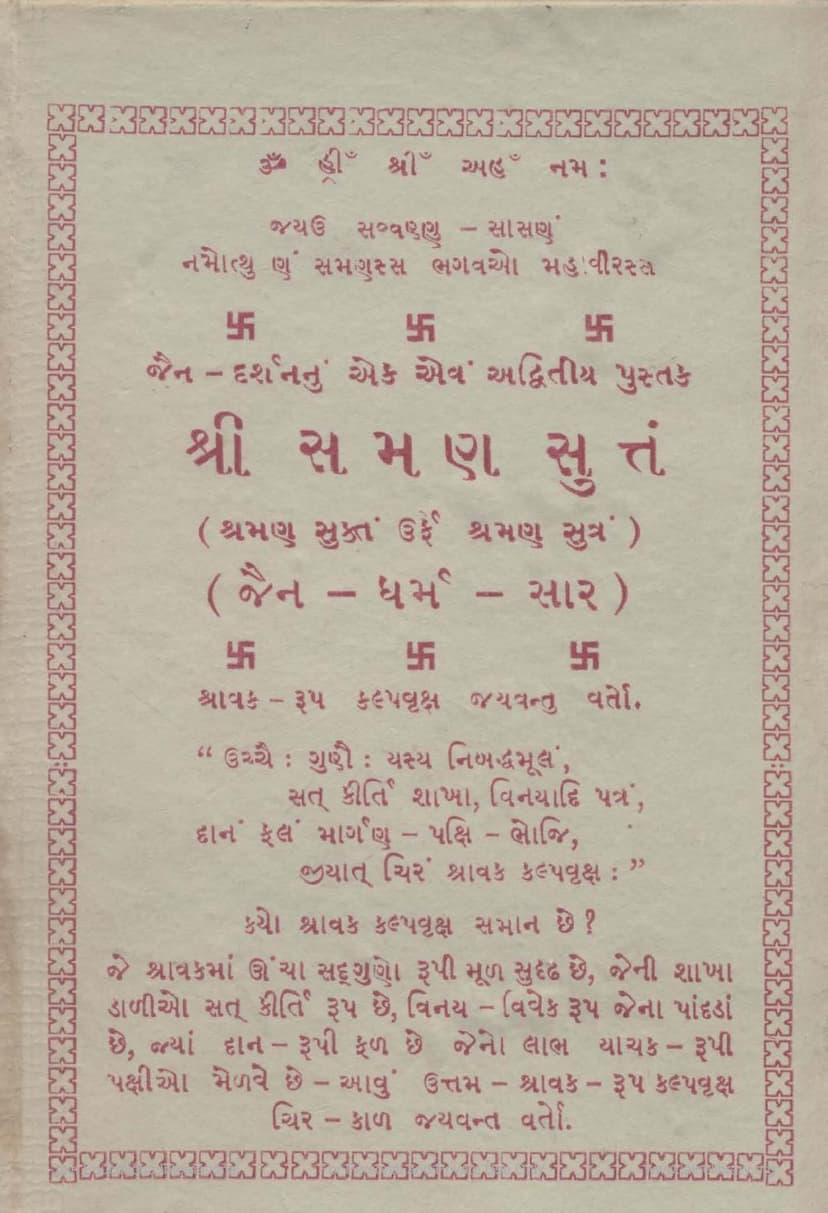Saman Suttam
Added to library: September 2, 2025

Summary
This document is a Gujarati Jain text titled "Shri Saman Suttam" (also known as "Shraman Sutra" or "Jain Dharma Saar"). It is a compilation by Prof. K. G. Shah. The publisher is Pradeepbhai Sheth from Ahmedabad. The text is primarily in Gujarati, with some Sanskrit and Hindi verses.
Here's a breakdown of its content and essence based on the provided pages:
Core Message and Purpose:
The "Saman Suttam" aims to present the essence of Jainism, covering its philosophy, principles, and practices in a concise and accessible manner. It emphasizes the importance of:
- Right Faith, Knowledge, and Conduct (Samyak Darshan, Samyak Gyan, Samyak Charitra): These are presented as the path to liberation (Moksha).
- Living Virtuously: The text highlights the importance of ethical conduct, purity, and detachment.
- Understanding Jain Principles: It delves into concepts like the six realities (Dravyas), the nine principles (Tattvas), the cycle of birth and death (Sansar), karma, and the path to spiritual liberation.
- Reverence for Knowledge and Spiritual Teachers: The text stresses the importance of respecting scriptures and enlightened beings.
- Parental and Elder Respect: A significant portion is dedicated to the importance of honoring and serving parents, recognizing their immense contribution.
- Dharma (Righteousness): It defines Dharma through qualities like forgiveness, humility, truthfulness, purity, self-control, penance, non-possession, and non-violence.
- Ahimsa (Non-violence): Ahimsa is presented as the foundational principle of Jainism, extending to all living beings, and is deeply intertwined with the concept of Anekantavada.
- Anekantavada (Multi-faceted Reality): The philosophy of seeing things from multiple perspectives is subtly woven throughout, advocating for tolerance and understanding.
- Self-Control and Detachment: The text guides towards conquering desires, controlling senses, and cultivating detachment from worldly possessions and relationships.
- Spiritual Practices: It mentions the importance of meditation (Dhyana), study (Swadhyaya), and penance (Tapas) for spiritual progress.
Key Sections and Themes:
The document is structured into several sections, each focusing on different aspects of Jain philosophy and practice:
- Introduction and Praise: Early pages include greetings, salutations to Lord Mahavir, and verses praising the ideal Jain householder (Shravak) as a Kalpavriksha (wish-fulfilling tree).
- Respect for Scriptures and Knowledge: Strict instructions are given on how to handle religious books, emphasizing the sanctity of knowledge and the consequences of disrespecting it.
- Identifying a "Gyaani" (Enlightened One): Several verses describe the characteristics of an enlightened person, who is indifferent to worldly riches, power, and sensory pleasures.
- The True Jain: Verses explore what it truly means to be a Jain, emphasizing virtues beyond outward appearance or rituals.
- The Importance of Parents: Numerous verses and poems are dedicated to extolling the virtues and sacrifices of parents, urging children to honor and serve them.
- The Mother's Greatness: The unparalleled love and sacrifice of a mother are particularly highlighted.
- The Role of Action and Knowledge: The interplay between knowledge (Gyan) and action (Kriya) is discussed, emphasizing their interdependence for spiritual progress.
- The Nature of Karma: The complex workings of karma and its consequences are explained, showing how actions lead to bondage and suffering.
- The Path to Moksha: The text outlines the Jain path to liberation, emphasizing self-realization, detachment, and the practice of virtues.
- The Six Dravyas: The fundamental Jain principles of the six eternal substances (Jiva, Ajiva, Dharma, Adharma, Akasha, Kala) are mentioned.
- The Twelve Bhavanas (Meditations): The text lists and briefly touches upon the twelve reflections or contemplations that aid in spiritual development.
- The Eightfold Path: Various practices and principles are described, including the five samities (careful conduct in walking, speaking, eating, taking and leaving objects, and excretion) and three guptis (control over mind, speech, and body).
- The Importance of Vows (Vratas): The text details the five great vows (Maha-vratas) for ascetics and the lesser vows (Anu-vratas) for householders.
- The Significance of Tapa (Penance): Both external and internal austerities are discussed as means to purify the soul.
- The Nature of Läsya (Disposition): The influence of different mental states (Käshna, Nila, Kapota, Teja, Padma, Shukla) on one's spiritual journey is described.
- The Fourteen Stages of Spiritual Progress (Guna Sthana): The text outlines the fourteen stages of spiritual development that a soul traverses on its path to liberation.
- The Importance of Samayik (Equanimity): The practice of equanimity and its role in spiritual progress is emphasized.
- The Significance of Svadhyaya (Self-Study): The text highlights the value of self-reflection and scripture study.
- Discourses on Various Jain Philosophies: Throughout the book, profound Jain concepts are explained, often with illustrative examples and verses.
- The Role of the Sangha (Community): The importance of the community of monks, nuns, and lay followers is mentioned.
- The Compilator's Efforts: The introductory and concluding remarks by Prof. K. G. Shah and the publisher shed light on the compilation process, the inspiration behind it (including Vinoba Bhave's suggestion), and the collaborative effort involved in bringing this comprehensive work to fruition.
Overall Tone and Style:
The "Saman Suttam" appears to be a devotional and educational text, written in an accessible Gujarati style. It uses verses, explanations, and practical advice to guide the reader towards a virtuous Jain life and spiritual enlightenment. The inclusion of tributes to the compiler's parents and other family members suggests a personal touch and a desire to honor lineage. The text also incorporates social commentary, particularly regarding the preservation of knowledge and practices, and the adherence to true Jain principles.